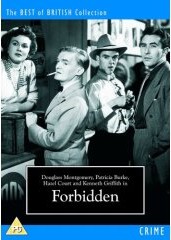'FORBIDDEN' (a.k.a. 'Scarlet Heaven') (1948)

- A review by Richard Harrison (2008)
I, probably in common with the vast majority of the UK population,
didn’t see the film Forbidden(a.k.a. Scarlet Heaven)
when it was shown on television back in 1978. A pity- it’s not been
shown since, and managed to disappear from the cinematic radar until
this 2007 Odeon Entertainment DVD release. It is part of an exciting
new collection (dubbed ‘The Best of British’) from Odeon, who have
uncovered obscure home-grown movies from film archives and
painstakingly restored them for new generations to enjoy. Each title is
ascribed a genre (which features in a colour-coded banner at top and
bottom of DVD artwork) and it is surprising as to the sheer range- from
Northern Comedy to Gothic Horror! As a complement to the film itself, a
very informative booklet comes with each title which enables the film
to be contextualised and further enjoyed as a result.
Forbidden is notable for being the last film starring Douglass
Montgomery (whose c.v. includes such great films as The Cat and the
Canary (1939) and The Way To The Stars (1945) before he
slipped into television appearances and eventual obscurity until his
death. Coincidentally, it was also the last film to be directed by
George King (whose first cinematic credit was in 1930, the same year as
Montgomery’s first screen appearance) and who died in 1966- bizarrely
the same year as Montgomery. Forbidden is resoundingly British
throughout, and utilises its Blackpool setting to splendid effect in
the same way that Brighton Rock(1947) anchors itself to that
seaside town. Generically, Forbidden is a crime thriller with Film
Noir elements, and is Hitchcockian in many respects, not least its
closing sequence. Made in 1948, Forbidden also resists the
temptation to dwell on wartime issues (such as the country’s rebuilding
programme) or the knock-on effects of war itself, but actually looks
forward to the 1950s in both its style and its content. In short, Forbidden
is an extremely well-made curiosity- and just how it has had such a
limited exposure remains a mystery.
The plot of the film concerns Jim Harding’s ‘sordid little Hell’ which
is revealed in flashback after an eye-catching opening which sees the
protagonist determinedly making his way through a fairground. The
cheery fair music continuing, Harding confronts his lover Jane Thompson
in a final effort to make her understand ‘what was behind it all’ which
motivates the film noir-esque flashback. As this narrative
chain progresses, two firm strands develop- Jim’s friendship with Jane
and his wife Diana’s flirtation with Jerry Burn (brilliantly played by
character actor Garry Marsh). This maintains the interest, as the
situation as it stands is irreconcilable, prompting action on the part
of our characters to resolve or alter the situation. That Jim confesses
to the adamant Jane ‘I just can’t lose you’ suggests he is losing his
rational self-control, and this is echoed in a memorable montage
sequence of subjective realism, the voices from the past returning to
haunt him as the images of the fairground swirl about his senses. His
resulting actions dominate the remainder of the film, and fill it with
several moments of effective suspense and well-handled tension. If
Hitchcock had not gone to Hollywood in 1940 at David O. Selznick’s
pressing financial request, he might well have made a film such as Forbidden.
It really is that good.
‘Forbidden’ (a.k.a. ‘Scarlet Heaven’) is available on DVD from Odeon
Entertainment.
Odeon Entertainment website
Back
Home

